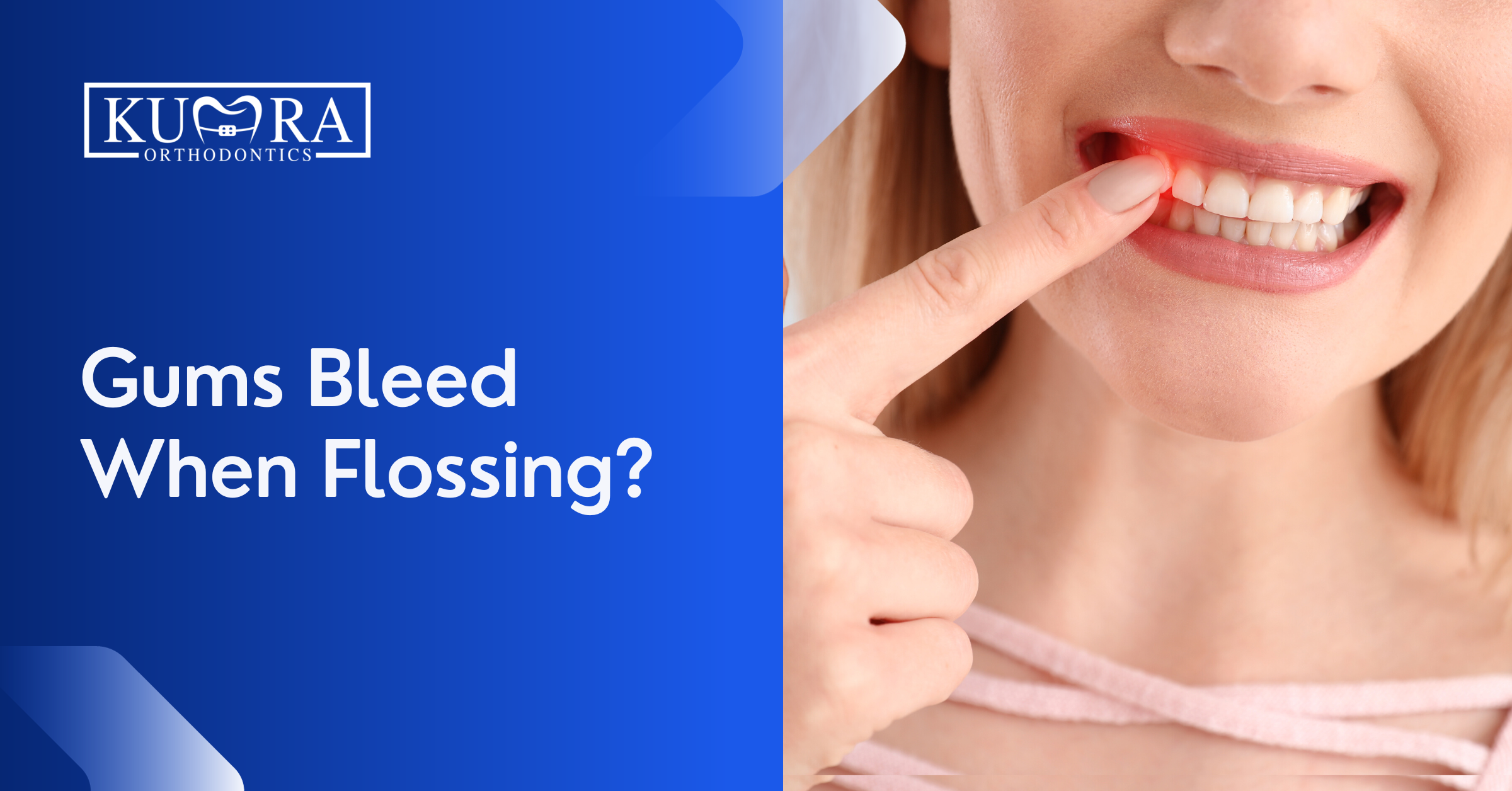Seeing blood when you floss can be a bit scary, but it’s not uncommon. It often means your gums aren’t in the best shape. Don’t worry, though – we’re here to help! This guide from Kumra Orthodontics will explain why your gums might bleed and how to stop it.
When you floss, you’re getting rid of bits of food and plaque your toothbrush can’t get to. If your gums bleed, it usually means they’re irritated from too much bacteria. A little bit of bleeding every now and then isn’t a big deal, but if it happens a lot, you might have a gum condition like gingivitis or periodontitis.
So, what can you do about bleeding gums? Well, knowing why it’s happening is the first step. From there, you can figure out the best solution, whether it’s brushing and flossing more often, eating healthier, or seeing your dentist. Keep reading to learn more about these causes and how to fix them.
Why is Flossing Important?
Flossing is often overlooked or neglected in our daily oral hygiene routine. However, it’s like the unsung hero of dental care. It efficiently completes the job that your toothbrush starts by reaching those tight spaces between your teeth and under your gums where a toothbrush can’t venture.
When you floss, you’re removing lingering food particles and plaque, which is a sticky film of bacteria that accumulates in those hard-to-reach areas. It is imperative because plaque buildup can lead to tooth decay and gum disease.
Moreover, flossing helps combat halitosis, commonly known as bad breath, which can be caused by trapped food particles and bacteria. By incorporating flossing into your daily routine, you’re not just preserving the health of your teeth and gums but also ensuring a fresher breath and a brighter smile!
Related: Flossing with Braces: The Proper Way to Floss with Braces
Is It Normal for Gums to Bleed When Flossing?
If you notice a tinge of red on your floss, you might wonder if it’s normal. Occasional bleeding, especially if you’ve flossed a bit too vigorously or are reacquainting yourself with the habit after a hiatus, isn’t usually cause for alarm. Your gums, in these instances, might bleed a little until they get accustomed to the flossing routine.
However, regular or consistent bleeding could be a red flag indicating inflammation or gum disease, such as gingivitis or periodontitis. These conditions require professional attention and treatment.
So, if your gums play a crimson tune every time you floss, it’s advisable to consult your dentist without delay. Remember, the goal of flossing is to support your gum health, not to cause discomfort or bleeding!
Why Do Gums Bleed When Flossing?
You might be wondering, why do your gums bleed when you’re simply trying to keep them clean? The primary suspect is often plaque buildup. The sticky film of bacteria, if not regularly removed by brushing and flossing, can cause gum inflammation or gingivitis. Left unchecked, gingivitis can progress to a more severe form of gum disease known as periodontitis.
However, plaque isn’t the sole cause of bleeding gums. Other culprits can include aggressive flossing, certain medications that affect gum health, hormonal changes (such as those during pregnancy), deficiencies in essential vitamins, or systemic health conditions like diabetes.
Understanding why your gums are bleeding is the first step towards addressing the issue. Collaborate with your dentist to identify the root cause and devise an effective treatment strategy. Remember, every aspect of your oral hygiene routine, including flossing, should contribute positively to your overall dental health!
How to Stop Gums from Bleeding When Flossing
Bleeding gums during flossing can be a worrisome sign, but it’s not always indicative of a serious health issue. Sometimes, it’s your body’s way of saying you need to adjust your oral hygiene habits. Here are several practical tips that can help curb bleeding and promote healthier gums.
Master the Art of Flossing
Believe it or not, there is a right and wrong way to floss. If you’re too aggressive or careless, you could harm your gums, leading to bleeding. The trick is to glide the floss gently between your teeth and along the gumline, following the curve of each tooth.
Avoid a sawing motion; instead, slide the floss up and down against the side of each tooth. This technique will help you remove plaque effectively without irritating your gums.
Consistency is Key
Flossing isn’t something you should do only when you remember or when you have something stuck between your teeth. It needs to be a regular part of your daily routine.
If you floss sporadically, your gums might bleed when you finally do. By making flossing a daily habit, your gums will become accustomed to the process, become healthier, and are less likely to bleed over time.
Choose Your Toothbrush Wisely
While flossing plays a crucial role in preventing gum bleeding, so does brushing. A hard-bristled toothbrush can be harsh on your gums, causing irritation and subsequent bleeding. Opt for a soft-bristled brush instead, which is kinder to your gums but still effective at removing plaque.
Remember to replace your toothbrush every three to four months or sooner if the bristles become frayed and worn out.
When to Seek Professional Help
Even with careful adherence to the tips provided, there’s a point where professional dental care may be necessary. Here’s how to spot the signs that it’s time to book an appointment with your dentist.
Persistent bleeding gums can be a serious concern. If you’re flossing gently and regularly but still experiencing bleeding, it could signal a deeper problem like gingivitis or periodontitis. These are forms of gum disease that need a dentist’s attention.
Bad breath that just won’t go away is another red flag. This isn’t just a social issue – it could mean bacteria are building up in your mouth, leading to potential gum disease or tooth decay. Masking the smell with mints or mouthwash isn’t enough – you need to tackle the cause.
Loose teeth should always trigger a call to the dentist. Adult teeth are meant to last a lifetime, and any movement is a sign of something serious, like advanced gum disease or bone loss.
If your gums hurt consistently, it’s time to seek professional help. A little discomfort from brushing or flossing too hard is normal, but ongoing pain isn’t. Especially if eating or drinking becomes difficult, you should see your dentist.
Needing an orthodontic appointment?
Visit Kumra Orthodontics Washington, DC or Kumra Orthodontics Stafford, VA, and request an appointment with us!
Bleeding Gums When Flossing: Common Misconceptions
When it comes to the topic of bleeding gums during flossing, numerous misconceptions abound. These can lead to unnecessary confusion and worry and can even deter individuals from maintaining proper oral hygiene.
To set the record straight, let’s delve into some of the most common myths surrounding this topic and provide accurate, insightful information to guide you in preserving your oral health.
Misconception 1: Bleeding Gums are a Normal Part of Dental Hygiene
One of the most prevalent misconceptions about dental health is that bleeding gums during flossing are perfectly normal. While it’s true that occasional, minor bleeding might occur if you floss too aggressively or if you’re new to flossing, consistent bleeding is a cause for concern.
It is often an early sign of gingivitis or periodontal disease. Instead of dismissing regular bleeding as a normal occurrence, it’s advisable to seek professional advice to rule out potential gum disease.
Misconception 2: Brushing Alone Suffices for Oral Hygiene
Another widespread misunderstanding is the belief that brushing teeth alone is sufficient for optimal oral hygiene. While brushing plays a critical role in cleaning the surface of your teeth and preventing cavities, it doesn’t fully address interdental cleaning.
Flossing complements brushing by removing food particles and plaque lodged between your teeth and along the gum line – areas your toothbrush can’t effectively reach. Thus, for comprehensive oral hygiene, both brushing and flossing should be integral parts of your daily routine.
Misconception 3: Flossing Leads to Receding Gums
The misconception that flossing leads to receding gums is another myth that needs debunking. Contrary to this belief, proper flossing techniques can actually help protect your gums from diseases.
Gum recession typically occurs due to aggressive brushing, poor dental hygiene, or as a symptom of an underlying periodontal disease. Flossing, when done correctly and gently, can prevent the build-up of plaque that contributes to these problems.
Maintaining Healthy & Normal Gums
Achieving and maintaining healthy gums is a crucial aspect of overall oral health. Here are some insightful tips to guide you on this journey:
- Cultivate the habit of daily flossing: Regular flossing is essential in removing plaque and food particles lodged between your teeth and along the gum line – areas your toothbrush can’t reach. This helps prevent the build-up of plaque and tartar, which are the leading causes of gum disease.
- Use a soft-bristled toothbrush: A soft-bristled toothbrush can clean your teeth effectively while being gentle on your gums. This prevents unnecessary gum damage and bleeding that can occur with hard-bristled toothbrushes.
- Quit smoking: Smoking is a significant risk factor for gum disease. It impairs your immune system, making it harder for your body to fight off a gum infection. Quitting smoking will significantly improve your oral health and reduce the risk of gum disease.
- Regular dental check-ups: Routine dental check-ups and professional cleanings are vital in maintaining your gum health. They allow your dentist to detect any potential issues early and provide appropriate treatment.
- Maintain a balanced diet: Consuming a balanced diet rich in vitamin C and calcium can enhance your gum health. Vitamin C has anti-inflammatory properties and aids in repairing tissues, while calcium strengthens the jawbone.
Always remember your oral health plays a significant role in your overall well-being. Therefore, maintaining healthy gums isn’t just about preserving a beautiful smile; it’s a critical aspect of comprehensive health care.
Bleeding from Flossing FAQs
How long does it take gums to stop bleeding when flossing?
If your gums bleed when you floss, they should stop bleeding within a few minutes. However, if you have just started flossing regularly or have resumed after a long break, it may take up to two weeks for your gums to stop bleeding. If bleeding persists beyond this period, consult a dental professional.
Why do gums bleed after not flossing for a while?
Gums bleed after not flossing for a while due to the build-up of plaque along the gum line. This can lead to gingivitis, an early stage of gum disease, which causes inflammation and bleeding.
Should I keep flossing if my gums bleed?
Yes, you should continue to floss even if your gums bleed. However, ensure you’re using the correct technique. Bleeding is often a sign of inflamed gums due to plaque buildup, and regular flossing can help remove this plaque. If bleeding persists, consult your dentist.
Do healthy gums bleed?
No, healthy gums should not bleed. Bleeding is usually an indicator of gum disease like gingivitis or periodontitis. If your gums bleed while brushing or flossing, it’s important to see a dental professional.
Can flossing cut your gums?
If done improperly, flossing can potentially cut or damage your gums. Always use a gentle touch and follow the correct technique to avoid injury.
Can you floss too much?
Yes, excessive flossing can lead to irritated, sore, or bleeding gums. It’s recommended to floss at least once a day, but doing so more than three times a day may be excessive and potentially harmful. As always, if you have questions or concerns about your oral health routine, contact a dental professional.
Take Control of Your Oral Health Today with Kumra Orthodontics
Navigating through the causes of bleeding gums and implementing the right remedies can often lead to improved dental health. However, personalized professional advice is indispensable for addressing your unique dental needs effectively.
At Kumra Orthodontics, our expert orthodontist is dedicated to providing personalized solutions for all your orthodontic concerns, including gum health. Our practice thrives on fostering well-informed patients and ensuring optimal dental health. If bleeding gums have been a concern, don’t hesitate to request an appointment with us. Your journey towards a healthy, beautiful smile could just be a click away.



